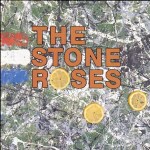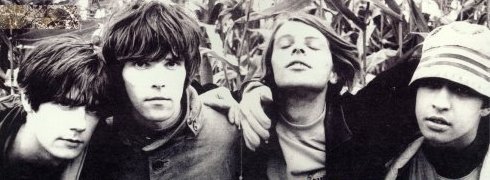This review was published as part of Puluche.com‘s Exemplar series – historical albums which score a perfect 100.
Comments
 Many bands have burst onto the scene with a debut album which defines their entire career, and many of those albums then go on to define the era in which they were released. The first album from the Stone Roses does both and much more besides. It is an album which perfectly encapsulates the climate of growing up in late 80’s Britain; the messianic self-belief of the chemical generation, the introspective questioning of desperate and disillusioned youth, the pure and simple euphoria of being young, pretty and cool. And yet, while The Stone Roses is undoubtedly the masterpiece of the Madchester period, it is also a timeless classic which sounds as innovative and vital now as it did in 1989. Put it next to any of the classic rock albums of the 60’s or 70’s, or any of those which arrived in its wake in the 90’s and new millennium, and The Stone Roses can confidently rub shoulders with the best while towering over the rest. It manages both to sound both modern and nostalgic, tipping its hat to its influences while also blazing a trail into the unknown. All these things combine to make it an artifact of the zeitgeist. Beyond the depth, the meaning and the legacy, it’s just a fantastic sounding record. Expertly mastered by producer John Leckie, a band of clothes-conscious, mop-haired street urchins are exposed as the consummate musicians they are, something which is often overlooked when talking about the band’s story and legend. And at the heart of it all is a song-writing partnership which began in a childhood sandpit and was forged over a mutual love of The Clash. The Brown-Squire axis has never been stronger than on this record…although who knows what the future might bring.
Many bands have burst onto the scene with a debut album which defines their entire career, and many of those albums then go on to define the era in which they were released. The first album from the Stone Roses does both and much more besides. It is an album which perfectly encapsulates the climate of growing up in late 80’s Britain; the messianic self-belief of the chemical generation, the introspective questioning of desperate and disillusioned youth, the pure and simple euphoria of being young, pretty and cool. And yet, while The Stone Roses is undoubtedly the masterpiece of the Madchester period, it is also a timeless classic which sounds as innovative and vital now as it did in 1989. Put it next to any of the classic rock albums of the 60’s or 70’s, or any of those which arrived in its wake in the 90’s and new millennium, and The Stone Roses can confidently rub shoulders with the best while towering over the rest. It manages both to sound both modern and nostalgic, tipping its hat to its influences while also blazing a trail into the unknown. All these things combine to make it an artifact of the zeitgeist. Beyond the depth, the meaning and the legacy, it’s just a fantastic sounding record. Expertly mastered by producer John Leckie, a band of clothes-conscious, mop-haired street urchins are exposed as the consummate musicians they are, something which is often overlooked when talking about the band’s story and legend. And at the heart of it all is a song-writing partnership which began in a childhood sandpit and was forged over a mutual love of The Clash. The Brown-Squire axis has never been stronger than on this record…although who knows what the future might bring.
Commendations
To retreat from the world and allow The Stone Roses to be your reality for 49 minutes is to indulge yourself in a musical experience filled with rare beauty and genius. From the unearthly echoes, steadily building bass and jangling intro to ‘I Wanna Be Adored’ to the extended, psychedelic abandon of ‘I am the Resurrection’s ecstatic finale, it is a collection of songs which scales impossible heights with every passing spine-tingling, skin-prickling second. Just when you think you may have heard the best song ever, another arrives to steal the crown.
The opening track rattles into existence on the echoes of distant dirty train tracks and guided warily through sinister, echoing alleyways by Gary ‘Mani’ Mounfield’s slowly building bass. John Squire’s guitar offers the first chinks of light, sending sparks over the brooding intro before taking the lead with a muscular, chiming riff. Ian Brown’s eerie, breathy vocals start swirling in the mix, offering cryptic hints at Luciferian deals: “I don’t need to sell my soul, he’s already in me…I wanna be adored…” It’s a stirring, sinister opener with hints of the band’s early days as a Goth outfit. ‘She Bangs the Drums’ then fully dispels any gloom. Drummer Alan ‘Reni’ Wren opens with a skittering Shaft-esque cymbal shuffle before Mani’s playful hook drags us in. Squire then crashes through with a sunburst power chord and suddenly it’s a better day. Ian Brown then delivers the killer blow: “Kiss me where the sun don’t shine…the past was yours but the future’s mine…” And with that, The Stone Roses became champions of the trampled youth. With the kids entranced, these Pied Pipers then conjure the mesmeric ‘Waterfall’. Driven by a Squire hook with peels like church bells, it’s a song of hope and renewal which rolls along on sweet vocals from both singer and drummer. But it’s the guitarist who takes it to the next level. Left to bring the song to its conclusion, Squire morphs and builds his earlier chiming refrain into a rolling 70’s rock riff which takes on a deeper voice and delivers a finale worthy of the song’s heroine and her determined quest for individual freedom.
The old adage “waste not, want not” applies to ‘Don’t Stop’ which is effectively ‘Waterfall’ played backwards with new Ian Brown lyrics sliding queasily through the weirdness in such a way that it sounds like his voice is also a reversed track. The slightly nonsensical lyrics add to the slightly seasick, off-kilter atmosphere. It’s a track which works in the same vein as those strange psychedelic fillers scattered through the tail-end of the Beatles catalogue. The band returns to normality with the beautiful yet scornful ‘Bye Bye Badman’. Conjuring up images of the ’68 student riots in Paris – “In this citrus sucking sunshine” describes the lemons used to counter the effects of tear gas, the same lemons on the album’s cover – it owes much to fellow Mancunians The Smiths in both music and lyrical content. John Squire’s jangly, guitar dances all over the track, subtly paying homage to Johnny Marr. Challenging the establishment, Ian Brown warns that he’s “throwing stones at you, man…I want you black and blue and I’m gonna make you bleed…Gonna bring you down to your knees.” After the anti-monarchy nursery rhyme of ‘Elizabeth My Dear’, we’re back into swaying, braying pop with ‘(Song for my) Sugar Spun Sister’. Brown takes a Byrdsian mop-topped, drug-dazed swagger across blue grass and under green skies while accusing the ruling class of being a bunch of glue sniffers. The majestic ‘Made of Stone’, perhaps the band’s most accomplished song, brings dramatic and mournful imagery to life through anthemic, rousing orchestration and inspired lyrics: “Your knuckles whiten on the wheel, the last thing that your hands will feel…your final flight can’t be delayed…”Punctuated by one of their most rousing choruses, at the time it was a triumph beyond their tender years: “Sometimes I fantasize…When the streets are cold and lonely and the cars they burn below me…”Taking a breath from all the drama, we’re treated to a lazy, warm blues shuffle with a cutting edge in the form of ‘Shoot You Down’. Reni’s drums brush around a restrained Squire as Mani plucks mellow strings and Brown the assassin lilts: “I’d love to do it and you know you’ve always had it coming.”
The run-in is a booming statement of potential greatness. ‘This is the One’ crashes into life before starting its ebb and flow, retreating to catch its breath under harp-like guitar refrains and whispered sugar-sweet lyrics before exploding again with such triumph and celebration that it leaves you utterly convinced that, yes – this is indeed the one. What that is just doesn’t matter. It is whatever you want it to be. That seems to be the point. It is the musical interpretation of just knowing; that feeling of perfect acceptance that nothing gets better than this. But of course, the previous 40-odd minutes will have taught you that behind every peak is another monumental musical Everest to behold – and there, from the summit of ‘This is the One’ we are left with the final colossus, the towering majesty of ‘I am the Resurrection’. Stomping in on Reni’s almost military-beat drums, Mani’s bass injects the groove before Ian Brown starts spitting attitude and sweet poetic put-downs: “Stone me, why can’t you see…you’re a no-one, nowhere, washed-up baby who’d look better dead…” John Squire shyly enters the fray in the background to begin with, letting the rhythm section take the lead and injecting little spiraling fills into the gaps until Brown’s holy refrain brings us to the break. Then all hell cuts loose. Reni starts playing drums like a Hindu god, covering the entire kit like only a multi-armed deity possibly could while Mani unleashes a carpet-bombing, rolling funk bass line over which Squire’s guitar squeals and squalls. The guitars gets dirtier, the drums get faster, the bass gets crazier – and then it breaks to silence…Only to chime back in before more thrashing reverb takes over once again. And then, the storm seems to ease, with a beautiful acoustic refrain filling the void – only we’re not finished yet, the drums, bass and pace quicken and we’re racing to the end again, finally fading out on an acoustic strum and the echoes of another Squire jam which could go on for eternity. It’s ballsy, breath-taking and beyond anything one would expect from a band’s first album. It nearly was the full-stop on their career. If it had been, it would have been one of the best exits since the Ascension.
Next Steps
After such an astonishing debut, some generation defining live shows and the release of the genre-busting ‘Fools Gold’ which left all their rivals in the dust, the Stone Roses dropped the mega-stardom ball and disappeared in a flurry of lawsuits and a miasma of lost focus and impetus. It would take five years for a follow-up to appear, by which time the Brown-Squire dynamic at the heart of the band had been undermined by drugs and ego. Second Coming was much-maligned but isn’t as bad as some make it out to be. It just wasn’t The Stone Roses II. The band limped on, losing first Reni and then Squire before a pale imitation self-destructed in 1996. Years of solo careers, rumors and denials followed until the band the world was waiting for returned in triumph in 2012 to old audiences and new, proving that the Stone Roses have an enduring magic and spirit that can be suppressed but never destroyed. Their debut album remains the best testament to that.
First published on: Puluche.com














